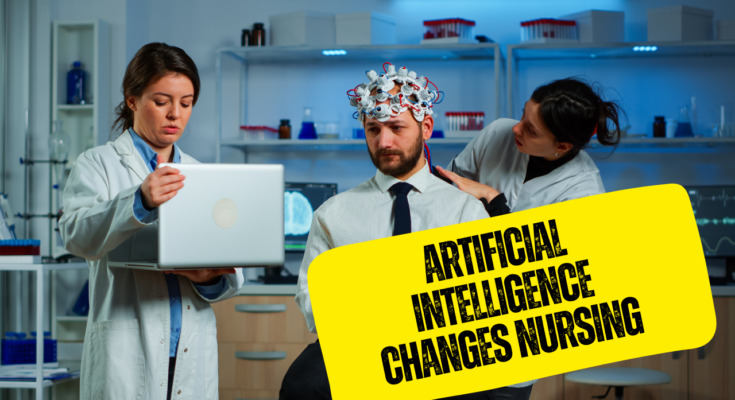Artificial Intelligence Changes Nursing: Robust changings
Artificial Intelligence:
AI is not a new technology. The word originated in 1956, when Stanford University computer scientist John McCarthy invented it while commanding the Dartmouth Summer Research Project. Since then, the AI sector has seen several ups and downs. Historically, humanity lacked the processing capability and enabling technology to analyze massive volumes of data, raising doubts about AI’s potential to meet promises. Beginning in 2011, the discipline saw significant growth, including breakthroughs in computer processing capabilities, access to enormous data sets required to train AI systems and the capacity to process them, and discoveries in algorithm designs that serve as the foundation for AI processing.
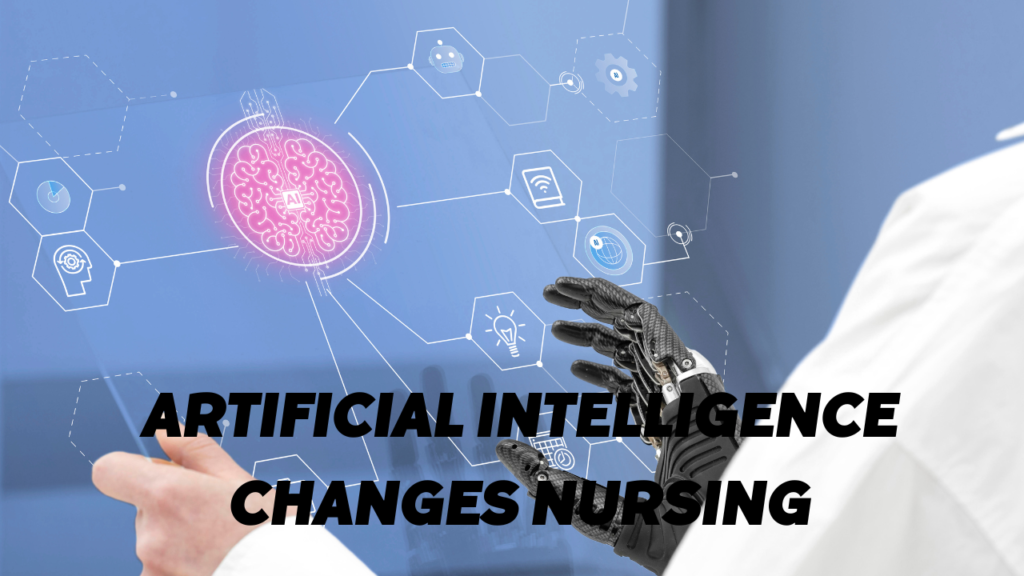
A literature search finds that there are several AI definitions, with some emphasizing technological features and others describing human elements of intelligent computers. Sara Castellanos, a technology journalist for The Wall Street Journal, summarizes the goal of AI as follows: “Artificial intelligence encompasses the techniques used to teach computers to learn, reason, perceive, infer, communicate, and make decisions similar to or better than humans.” AI is not a single technology, but rather a set of technologies that perform different roles depending on the job or problem being solved.
How are robots changing the nursing profession?
Robotic engineers are advancing what robots can do and how they emotionally respond to circumstances, Artificial Intelligence Changes Nursing. Emotionally responsive robots are commonly called social or companion robots. Although we aren’t at the stage of robots taking over, they’re entering healthcare delivery sites, our homes, and our workplaces. Social robots are designed to interact in ways that make them human by responding to human interactions. Sophia is an example of a social robot conceived as a companion for older adults that demonstrates the potential of technologic advancements to improve how robots function. In 2018, Sophia was redesigned with mobility capabilities and is now the first robot to be given citizenship in a country (Saudi Arabia).
Researchers around the globe are creating robots to help people drive, impact suicide rates, support clinical telehealth applications, and more. As robots learn to perform nursing functions, such as ambulation support, vital signs measurement, medication administration, and infectious disease protocols, the role of nurses in care delivery will change. Research suggests that between 8% and 16% of nursing time is spent on non nursing activities and tasks that should be delegated to others. Nurses with robot support will have the ability to take back this time and spend more of it with patients.
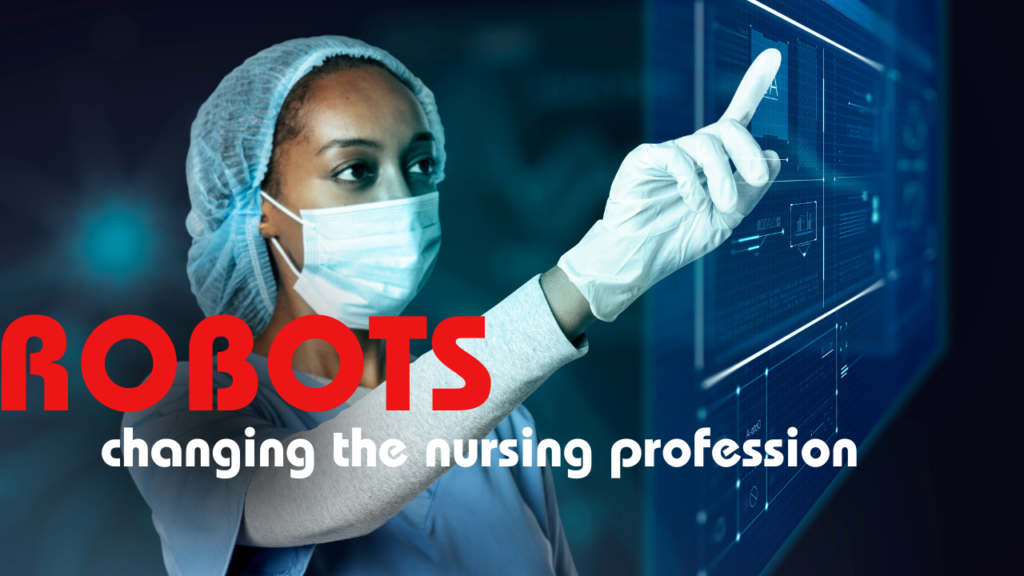
Beginning in 2014, nursing-centered robotics project grants have been funded by the National Science Foundation (NSF) to promote the use of robots in nursing activities. To date, NSF has invested over $3 million in learning how robots can perform nursing functions. Does this mean that nurses are destined to become obsolete? Absolutely not; quite the opposite is occurring. Nurses are actively engaged in the creation and use of robots designed for patient care and older adult support. The robots are viewed as assistants that can help nurses at the bedside or in the community.
The University of Cincinnati College of Engineering and Applied Science, College of Allied Health Sciences, and College of Arts and Sciences and Maple Knoll Village, a local independent living and retirement community, collaborated to launch a nurse-led telehealth robot project called TCHAT (Telehealth Community Health Assistance Team). The goal of the project was to evaluate nurse-led interventions for the promotion of healthy lifestyles and chronic illness management using a telepresence robot. The project was a combination of one in-home visit to start the healthcare program and follow-up telehealth remote visits in the home. Data were collected on participant health outcomes and the usability of and satisfaction with the robot intervention.
How are nurses collaborating on AI applications?
Microsoft CNO and National Director, US Provider Industry, Molly McCarthy views AI as a tool that supports nursing by allowing nurses to practice at the top of their license. McCarthy has observed that today’s nurses spend time doing things that should be performed by someone else with different skills. In the future, Artificial Intelligence Changes Nursing tools will relieve nurses of these activities, enabling them to focus their efforts on professional activities that utilize the full extent of their education, training, and experience.
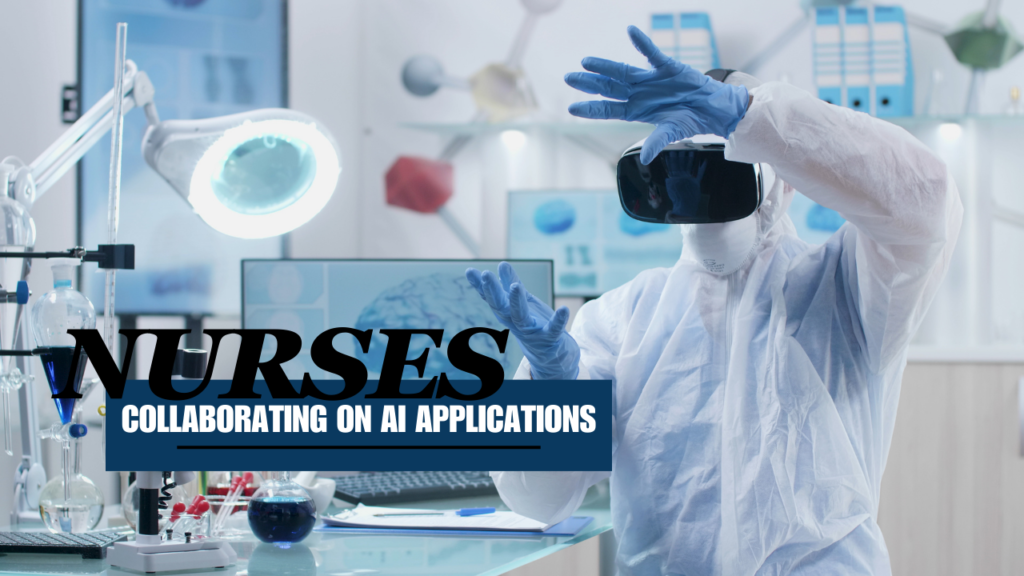
Microsoft is involved in applying AI technologies in three core healthcare application areas—clinical, financial, and operational—working with nursing teams to identify areas where AI technologies can provide added value for the healthcare team and patients. According to a Microsoft spokesperson, “Nurses are integral to the design, development, and deployment of health information technology.
Implementing new ways of working is always challenging and the deployment of AI technologies is no exception. McCarthy suggests that AI teams can achieve success if they incorporate the following implementation processes into AI projects:
-
Identify a proof of concept that involves frontline users (physicians, nurses, and inter professional team members) who have a pain point to resolve. The pain point must be important enough for team members to give time to the project.
-
Cultivate a growth mindset that embraces new practices and accepts failures as part of the process. Culture and leadership are keys to success.
-
Respect that clinicians have limited time to contribute; be prepared with essential information, answers to common questions, and feedback.
-
Identify measurable outcomes that are meaningful and contribute to organizational goals.
-
Look outside healthcare to see how AI technologies have helped advance other industries, Artificial Intelligence Changes Nursing and learn from others.
Algorithms—the building blocks of AI
According to the Merriam-Webster dictionary, an algorithm is “a step-by-step procedure for solving a problem or accomplishing some end.” In the field of AI, algorithms are automated instructions that tell a computer what to do. The instructions are mathematically driven and can be as simple as “if X, then Y” actions or encompass complex mathematical layers of instructions to execute a task or find an answer to a problem. The algorithm manipulates data in a variety of ways, such as sorting, inserting, replacing, or searching for a data attribute. It solves problems when it carries out the instructions.
When you hear someone talk about a machine that learns, the machine is executing a structured set of mathematical procedures. The machine learns how to correct itself based on data used to train the application or by iterating on data used by the application once deployed. How the machine learns to correct itself depends on the mathematical models selected for the task. Data scientists and machine learning programmers are the team members who select and adjust the mathematical models used in applications.
The Role of AI in Nursing and Patient Care
AI can’t replace the compassion, instincts, and communication skills of experienced nurses, though AI tools will likely become an even bigger part of their daily routine in the near future. Artificial Intelligence Changes Nursing, in the healthcare has the potential to benefit patients, providers, and care facilities by streamlining certain processes and offering important new insights.
When many people think about artificial intelligence, they imagine the dystopian depictions they’ve seen in sci-fi movies. However, AI is currently much closer to a superpowered data processor than a sentient being that can solve complex problems. AI relies on massive data inputs to make analyses and recognize patterns, which makes it ideal for data-driven fields like healthcare.
In the medical field, many examples of artificial intelligence may be more accurately described as augmented intelligence, because its primary role is to help trained human providers make better-informed choices. By analyzing data from a wide range of sources, Artificial Intelligence Changes Nursing to become more efficient and effective in many aspects of their jobs.
Current AI Applications in Nursing and Patient Care
Artificial Intelligence Changes Nursing, everywhere from diagnostics and decision-making to triage and patient monitoring. As health data becomes more robust and Artificial Intelligence Changes Nursing, AI become even more powerful and accessible, they’ll play an increasingly important role in patient care. Let’s take a look at a few of the ways AI is already making an impact for nurses and their patients.
| 1. Streamlining Administrative Tasks | Nurses spend a significant portion of their time on administrative work, such as documentation. AI can automate or streamline these tasks, freeing up nurses’ time and mental energy for patient care. AI-assisted voice recognition and language processing technology can help save time on documentation and reduce inaccuracies. |
| 2. Improving Clinical Decision-Making | Artificial Intelligence Changes Nursing, AI-powered tools can provide insights based on patient health history, physiology, and genetics, leading to earlier detection and more accurate diagnoses. It can assist in deciding appropriate courses of action for patients. However, AI has limitations in understanding empathy, ethics, and complex clinical decisions. It may overlook rare or complicated cases, necessitating the intuition and critical-thinking skills of nurses. |
| 3. Enhancing Patient Monitoring and Safety | AI technology processes patient data from various sources to identify potential complications and ensure readiness to react to adverse events. It aids in monitoring vital signs, predicting risks of falling, and spotting signs of infection. Predictive AI identifies unique risks in each patient for personalized treatment. |
| 4. Supporting Patient Engagement and Education | AI chatbots and virtual assistants provide personalized educational materials and support patient engagement by offering access to health information round the clock. Patients who actively participate in their care have better health outcomes. AI ensures patients can access relevant health information based on their data, history, and preferences. |
Many health conditions have frequently asked questions that come up among patients, and getting an instant response instead of having to wait until their provider’s office opens can relieve a lot of anxiety. AI-assisted apps and devices can also help patients stick with their treatment plans by offering reminders for medications or other home-care treatments. By helping patients understand their health and offering advice tailored to their needs, AI can encourage patients to remain engaged in their own healing.
Mobile Health, AI Medical Carts, and Sensor-Based Devices
The pandemic reshaped how we think about and deliver remote healthcare. AI technologies deliver advancements to remote and mobile healthcare, allowing nurses to provide care and monitor their patients more effectively even from remote settings.
As we enter 2024, the nationwide nursing shortage continues to create problems for healthcare staff and patients. Nurses are required to do more than ever with dwindling resources and the constant threat of burnout. AI technology can help.
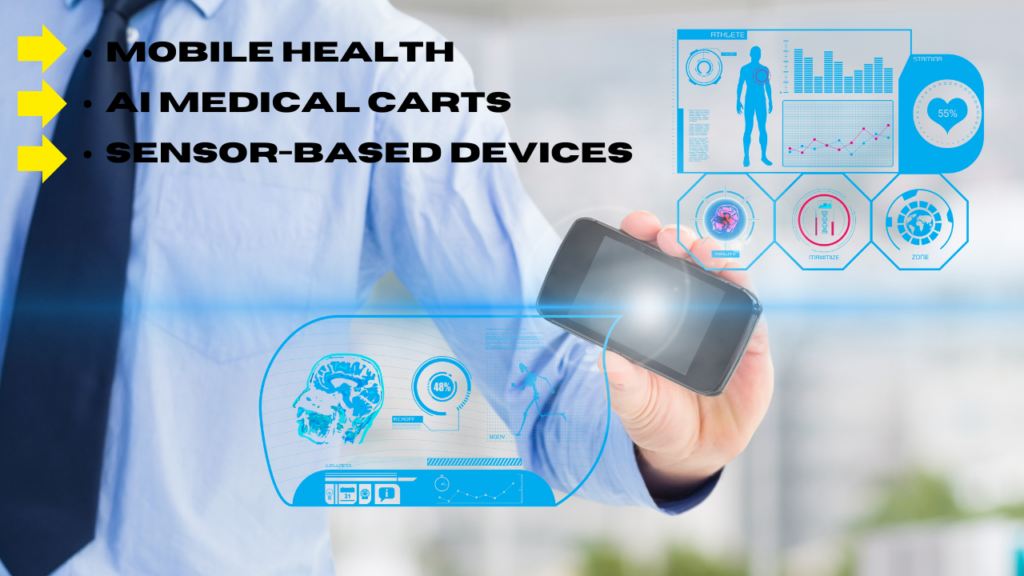
AI applications implemented in mobile and sensor-based technologies allow nurses to monitor patients remotely, eliminating the need for in-person encounters every time a patient’s data needs to be measured. For example, nurses can use a sensor-based AI medical cart to measure a patient’s body movement, heart rate, and weight from their home.
These tools allow that Artificial Intelligence Changes Nursing, to analyze patients and identify additional care needs or support required without the time commitment –– from either party –– of an in-person visit or hospital stay.
Training and Adaptation for Nurses
While nurses certainly aren’t at risk of losing their jobs to AI, learning how to use AI healthcare technologies will be an important part of keeping their skills current and how Artificial Intelligence Changes Nursing? Nursing education programs will need to adapt their curriculum to reflect rapidly evolving healthcare technology. Similarly, healthcare organizations and employers will need to prioritize professional development programs to help their people make the transition to using more AI-based tools.
Implementing any new technology throughout a large organization is always a challenge, and AI can be a polarizing topic. Some nurses may be hesitant to embrace the growing use of AI in healthcare , whether it’s due to underlying concerns about job security or simply a reluctance to change the way they’ve been working. However, Artificial Intelligence Changes Nursing has the potential to drastically improve nurses’ ability to do their jobs, and there’s no replacing the human element of patient care that trained nurses provide.
The Future of AI in Nursing
The ongoing Artificial Intelligence Changes Nursing will take many different forms. As we continue finding new ways to gather and analyze patient data, we’ll be able to train AI platforms to make better use of health information to aid nurses in caring for their patients.
In the near future, nurses will almost certainly see a significant increase in voice-assisted technology to streamline patient documentation. AI-based robotics may also be used for medication management or assisting with certain procedures. Nurses are also likely to see an increase in AI-assisted diagnostic methods that are less invasive to patients than current methods like biopsies.
As Artificial Intelligence Changes Nursing, continues to develop, avoiding potential biases in data or algorithms must be a priority for product developers and programmers. Similarly, gathering input from the nurses who use AI applications in the real world will be essential to making them as useful—and ethical—as they can be.
